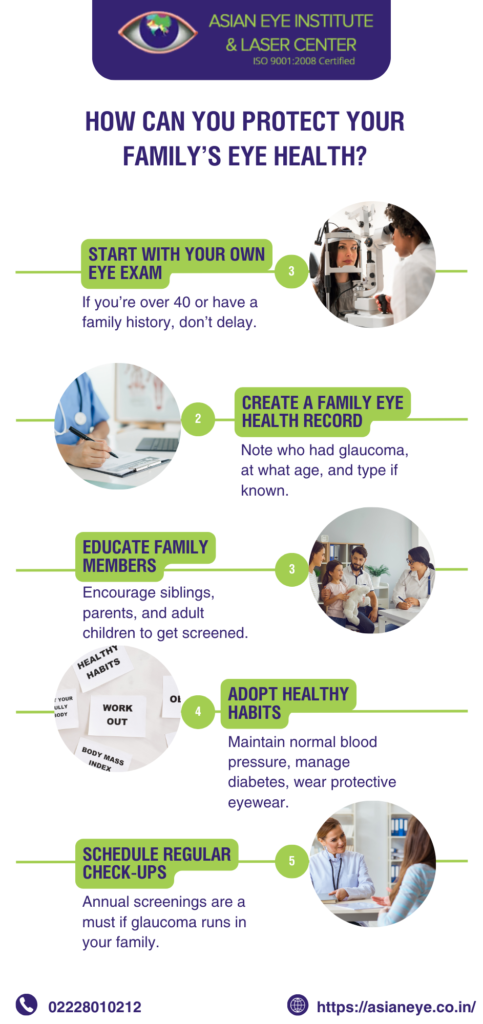Have you ever wondered if eye diseases run in families? If someone in your family has been diagnosed with glaucoma, it’s time to take it seriously. Glaucoma, often called the “silent thief of sight,” is one of the leading causes of irreversible blindness — and yes, it can be hereditary.
In this blog, we’ll break down what glaucoma is, how genetics play a role, and what steps you can take to protect your family’s eye health.
What is Glaucoma?
Glaucoma is a group of eye conditions that damage the optic nerve, which is essential for good vision. This damage is often caused by abnormally high pressure in the eye, also known as intraocular pressure (IOP).
There are several types of glaucoma:
- Primary Open-Angle Glaucoma (POAG) – the most common form, slow and painless
- Angle-Closure Glaucoma – more sudden and painful; an emergency
- Normal-Tension Glaucoma – optic nerve damage without high pressure
- Secondary Glaucoma – caused by an injury or underlying condition
- Congenital Glaucoma – present at birth, rare but serious
Is Glaucoma Hereditary?
Yes — genetics can play a big role. While anyone can develop glaucoma, your risk increases significantly if you have a family history, especially a first-degree relative (parent, sibling, or child).
Research Says:
- If your parent has glaucoma, your risk is 4 to 9 times higher.
- Genetic mutations like MYOC, OPTN, and TBK1 have been linked to glaucoma development.
- Ethnicity also plays a role – African, Hispanic, and Asian populations have a higher genetic predisposition.
Who Should Be Concerned?
You’re at higher risk if:
- You are over 40 years old
- You have a family history of glaucoma
- You are diabetic or hypertensive
- You are very nearsighted or farsighted
- You’ve experienced an eye injury or surgery
- You are of African, Hispanic, or Asian descent
Why Early Detection Matters
One of the biggest challenges with glaucoma is that it often shows no symptoms until vision loss begins. Regular eye check-ups become crucial, especially if it runs in your family. Early detection can:
- Prevent or slow down vision loss
- Help preserve quality of life
- Minimize the need for invasive treatments
What Tests Can Detect Glaucoma Early?
When you visit an ophthalmologist like Dr. Hitesh Chheda, a comprehensive glaucoma screening includes:
- Tonometry – measures eye pressure
- Ophthalmoscopy – examines the optic nerve
- Perimetry (Visual Field Test) – checks peripheral vision
- Pachymetry – measures corneal thickness
- Gonioscopy – inspects the drainage angle in the eye
Treatment Options for Glaucoma
Although glaucoma cannot be reversed, early treatment can stop or slow its progression. Treatment options include:
1. Eye Drops
- First-line treatment to lower eye pressure
- Must be used consistently
2. Oral Medications
- Sometimes prescribed alongside drops
3. Laser Therapy
- Trabeculoplasty for open-angle glaucoma
- Iridotomy for angle-closure glaucoma
4. Surgery
- For advanced or unresponsive cases
- Includes procedures like trabeculectomy or shunt implants
How Can You Protect Your Family’s Eye Health?

FAQs About Hereditary Glaucoma
Conclusion: Don’t Let Glaucoma Steal Your Sight
If glaucoma runs in your family, don’t wait for symptoms. Talk to your ophthalmologist, book regular checkups, and encourage your loved ones to do the same. Early intervention is the most powerful tool you have in preventing permanent vision loss.
Worried about your family’s eye health?
Schedule a consultation with Dr. Hitesh Chheda at Asian Eye Hospital & Institute today.

